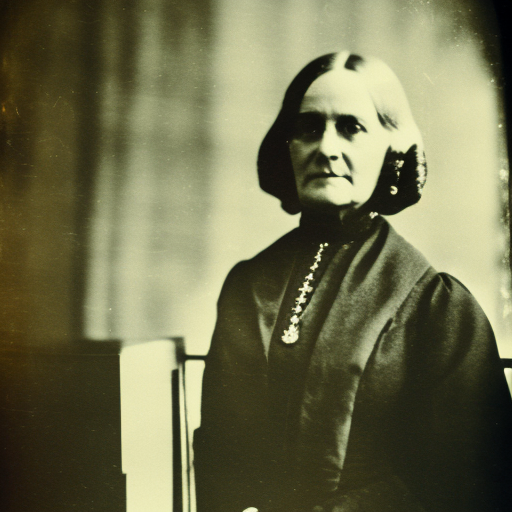Susan B. Anthony: A Pioneer in Women’s Rights
Susan B. Anthony was a prominent figure in the women’s suffrage movement in the United States during the late 19th and early 20th centuries. She dedicated her life to advocating for women’s rights, including the right to vote. Anthony played a crucial role in shaping the feminist movement and is remembered as a pioneer in the fight for gender equality.
Early Life and Activism
Susan B. Anthony was born on February 15, 1820, in Adams, Massachusetts. She grew up in a Quaker household, which instilled in her a strong sense of social justice and equality. Anthony’s family was actively involved in the abolitionist movement, and she became involved in activism from an early age.
In the 1850s, Anthony became involved in the temperance movement, which aimed to reduce or eliminate the consumption of alcohol. This experience helped her develop her skills as a public speaker and organizer. However, Anthony soon realized that women’s rights were closely intertwined with temperance and decided to focus her efforts on advocating for gender equality.
The Women’s Suffrage Movement
In 1851, Susan B. Anthony met Elizabeth Cady Stanton, another prominent suffragist, and the two formed a lifelong partnership in the fight for women’s rights. They co-founded the Women’s Loyal National League in 1863, which advocated for the abolition of slavery and women’s suffrage.
Anthony and Stanton played a crucial role in organizing the first Women’s Rights Convention in Seneca Falls, New York, in 1848. At the convention, they presented the Declaration of Sentiments, which demanded equal rights for women, including the right to vote. This convention marked the beginning of the women’s suffrage movement in the United States.
Throughout her life, Anthony tirelessly campaigned for women’s suffrage. She traveled across the country, delivering speeches, organizing conventions, and lobbying politicians. Anthony believed that women’s suffrage was essential for achieving gender equality and actively worked to change public opinion on the matter.
The Fight for Women’s Right to Vote
Anthony faced significant opposition and criticism for her activism. She was arrested in 1872 for illegally voting in the presidential election, as women were not yet granted the right to vote. Anthony’s trial received widespread attention and helped bring the issue of women’s suffrage to the forefront of public discourse.
Despite facing numerous setbacks, Anthony never wavered in her commitment to the cause. She formed alliances with other suffragists and worked tirelessly to build a broad-based movement. Anthony believed in the power of grassroots organizing and encouraged women to join suffrage societies and work for change at the local level.
Legacy and Impact
Susan B. Anthony’s tireless efforts and dedication to women’s rights laid the foundation for the eventual passage of the Nineteenth Amendment to the United States Constitution in 1920, which granted women the right to vote. Although Anthony did not live to see this victory, her contributions were instrumental in achieving this milestone.
Anthony’s legacy extends beyond the women’s suffrage movement. She was also a strong advocate for women’s education, labor rights, and the abolition of slavery. Her work paved the way for future generations of women to fight for their rights and continue the struggle for gender equality.
Today, Susan B. Anthony is remembered as one of the most influential figures in American history. Her dedication, perseverance, and unwavering commitment to women’s rights continue to inspire activists around the world. Anthony’s legacy serves as a reminder of the importance of fighting for equality and justice for all.












